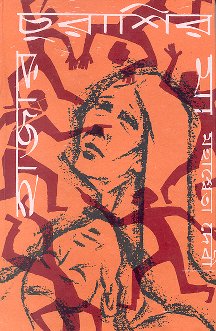
Summary
Hajar Churashir Maa (No. 1084's Mother) is a 1974 Bengali novel written by Ramon Magsaysay Award winner Mahasweta Devi.[1] It was written in 1974 on the backdrop of the Naxalite revolution in the Seventies.[2][3][4]
 Hajar Churashir Maa front cover | |
| Author | Mahasweta Devi |
|---|---|
| Cover artist | Khaled Chaudhury |
| Language | Bengali |
| Publisher | Karuna Prakashani, Kolkata |
Publication date | 1974 |
| Media type | Print (Hardcover) |
| ISBN | 978-81-8437-055-3 |
Overview edit
Hajar Churashir Maa (means Mother of 1084) is story of a mother (Sujata) whose son (Brati), corpse number 1084[5] in the morgue, was brutally killed by the state because of his ideology of advocating the brutal killing of class enemies, collaborators with the State and counter-revolutionaries within the Party. The story starts on the eve of Brati's death anniversary when Sujata recollects her son starting from his birth. She meets Brati's close accomplice and tries to justify Brati's actions and his revolutionary mentalities. Throughout the story she is portrayed as a strong woman who fought against the odds. She is advised to forget her son, as people like her son are what are often called "cancerous growth on the body of democracy".[6] It's a story of a mother as she relives, years later, the death of her son in the political upheaval that left almost no home untouched.[3] Hajar Churashir Maa also portrays the other faces of the human stories that emanated from the restless political adventure of the vibrant Bengali youth, which was ruthlessly cowed by the then Congress government until the Communist Party displaced them and who then again themselves ruthlessly cowed their opponents, the same Bengali youth.[7]
Characters edit
- Sujata: Main protagonist and a modern strong mother.
- Brati: Rebel and son of Sujata.[8]
- Dibyanath: Husband of Sujata and seen as same type of people against whom Brati fought.
- Nandini : girlfriend of Brati
Film adaptation edit
Govind Nihalani made this novel to a film called Hazaar Chaurasi Ki Maa in 1998.[1][4][5]Hazaar Chaurasi Ki Maa won the National Film Award for Best Feature Film in Hindi.
Award edit
Mahasweta Devi got the Jnanpith Award in 1996 for this book,[5][9] which she received from South African freedom fighter and president Nelson Mandela.[10]
References edit
- ^ a b "'Through her writing, you get to hear the voice of a community that is otherwise voiceless'". Rediff news. Retrieved 23 August 2019.
- ^ Word power The Telegraph. Published Sunday, 5 February 2006. Retrieved 17 July 2012
- ^ a b THE SIXTY-YEAR JOURNEY: BHASHA LITERATURE The Hindu. Published Sunday, 7 March 2010. Retrieved 17 July 2012
- ^ a b Hajar Churashir Maa Retrieved 17 July 2012
- ^ a b c Of death and resurrection Rediff news. Retrieved 17 July 2012
- ^ Mahasweta Devi. Hajar Churashir Maa.Karuna Prakashani (1974) p 31.
- ^ Bengali Books Online. Author Profile - Mahasweta Devi Archived 23 September 2015 at the Wayback Machine Retrieved 17 July 2012
- ^ Women and Violence by Sudeshna Chakravarti Book review of Women Writing Violence: The Novel and Radical Feminist Imaginaries. Economic and Political Weekly. Vol - XLIX No. 3, 18 January 2014
- ^ JNANPITH LAUREATES Archived 18 February 2012 at the Wayback Machine Retrieved 18 July 2012
- ^ Mandela presents Jnanpith award to Mahasveta Devi The Times of India. Published 29 March 1997. Record Number : A0080925. Retrieved 18 July 2012
- ^ Hajaar Churasir Maa(Hardcover, Bengali) Flipkart.com. Retrieved 18 July 2012
External links edit
- Biography of Mahasweta Devi Retrieved 17 July 2012
- Emory University English department emory.edu. Retrieved 29 July 2012
- One Of A Rare Tribe outlookindia.com. Retrieved 29 July 2012
- Roy, Pinaki. "Mother of 1084: A Chronicle of Deadly Times". Mahasweta Devi's 'Mother of 1084': Critical Readings and Rereadings. Eds. Sarkar, J., and S. Debnath. Kolkata: Books Way, 2013 (ISBN 978-93-81672-54-9). pp. 45–56.
- Roy, Pinaki. "Mahasweta Devi’s Mother of 1084: Rereading the Narrative of Protest". Labyrinth (I.S.S.N. 0976-0814), 4 (4), October 2013: 12-22
- https://web.archive.org/web/20160304000127/http://www.thelabyrinthjournal.com/pdfs/Labyrinth%20ISSN%200976-0814%20Vol.4%20No.4.pdf)


